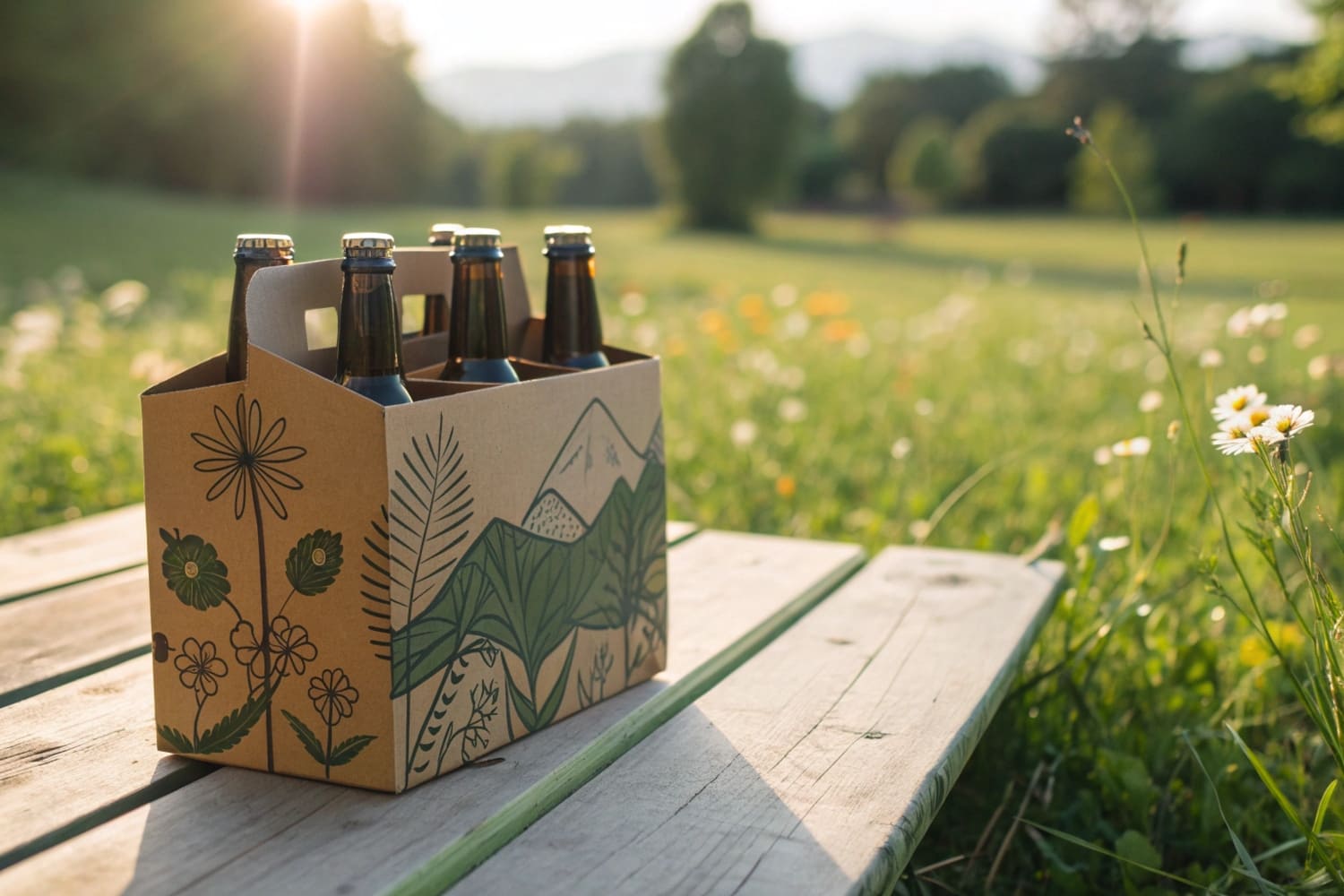I see growing pressure from buyers who want lower waste and lower cost. I also see confusion. I will show clear choices, simple trade-offs, and steps I use in real projects.
We offer fiber-first beer packaging: recycled corrugated cartons, paperboard carriers, water-based inks, and plastic-free coatings. We also support returnable glass loops, high-recycled aluminum, lightweighting, and modular POP displays that flat-pack and cut transport emissions.
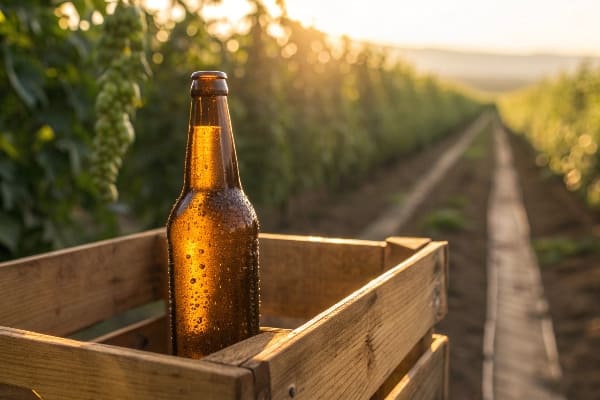
I keep the reading simple and useful. I start with what works now. I then map what to change next. I close with a checklist you can use with any supplier.
What are the sustainable options for packaging?
I often meet teams stuck between cost and impact. The choice feels hard. It is not. Start with fiber, reduce weight, and plan for real recycling.
Top options include recycled corrugated cartons, FSC paperboard carriers, aluminum cans with high recycled content, returnable glass where loops exist, plastic-free water-based coatings, washable paper labels, and mono-material designs that sort easily.
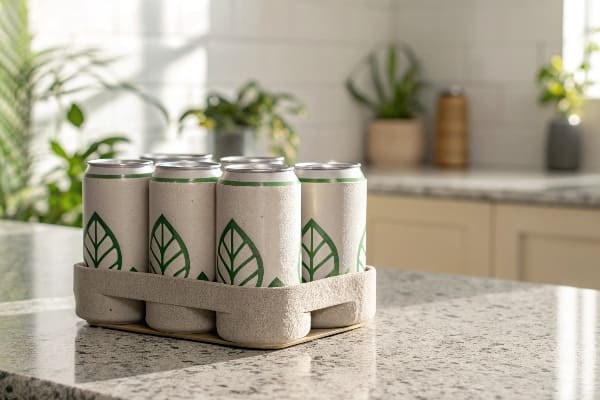
Practical menu by package type
I design beer packaging for speed, strength, and brand impact. I also build displays for retail launches. I now break options into simple buckets so engineers and buyers can choose fast.
Primary packaging (touches beer)
— Aluminum cans1: target ≥70% recycled content where available. Cans ship light. Scrap value is strong.
— Glass bottles: best in return systems with short transport loops. For one-way glass, choose light-weight flint and minimize label glue.
— Kegs: stainless steel with refurb cycles is strong for draft channels.
Secondary/tertiary (carriers and shipping)
— Paperboard carriers2 (4/6/8/12-pack): use 100% recycled or mixed FSC fiber, water-based inks, and varnish with plastic-free dispersion coating.
— Corrugated cases: use high-recycled content (test ECT to avoid over-spec). Go flat-pack. Design hand holes only when needed.
— Eliminate plastic overwrap: switch to fiber can-collars or wrap-around cartons. Trial tear-strip corrugate instead of shrink.
POP / display packaging
— Floor and pallet displays in corrugated with smart folding save time in stores. I build them modular to fit Costco or Walmart specs. We test load, drop, and humidity. Light parts cut freight and emissions.
| Area | Better Option | Why it helps | Notes |
|---|---|---|---|
| Can carriers | Fiber board clip | Plastic-free; easy curbside | Check neck strength; add anti-scuff |
| Carton coating | Water-based dispersion | Recyclable; low VOC | Gloss level now strong |
| Inks | Water-based | Fewer solvents | Good on digital and flexo |
| Labels | Wash-off paper | Aids bottle return | Avoid plastic laminates |
| Palletization | Flat-pack displays3 | Lower cube, fewer trucks | Train teams on quick assembly |
I keep structure minimal. I remove anything a MRF cannot sort. I avoid mixed laminates. I also run strength tests so light designs still survive transit.
What is the most sustainable beverage packaging?
Many teams want one final answer. The truth depends on the loop. Reuse beats one-way when return distance is short. Recycled aluminum often wins when transport is long.
Returnable glass is most sustainable in short, efficient loops; recycled aluminum cans are most sustainable for longer transport; fiber-based secondary packaging with high recycled content supports both paths.
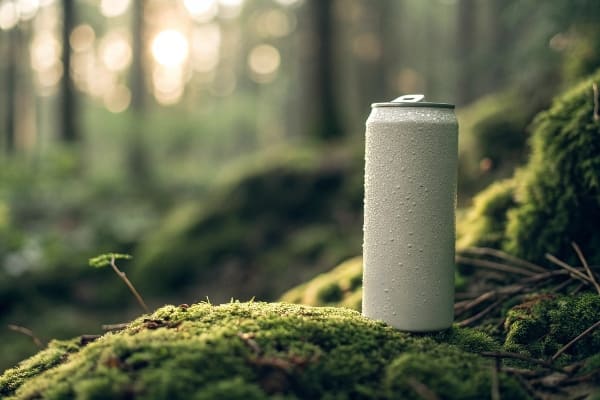
How I choose between glass and aluminum
I never guess. I map distance, breakage, and recycling rates. I keep the math simple and transparent.
1. If you have a working bottle return within a few hundred kilometers, choose returnable glass4. Each reuse cycle spreads the footprint over many fills. Use wash-off paper labels and modular crates.
2. If you ship far or your market lacks strong glass return, choose aluminum cans with the highest recycled content you can secure. Cans are light, stack well, and have strong scrap value.
3. For festivals and sports, cans are often safer and faster to chill.
4. For premium lines, consider light-weight glass with reduced neck and base. Pair with fiber carriers to avoid plastic rings.
*5. Always cut secondary weight: right-size corrugate, remove plastic windows, pick water-based inks, and avoid foil cold-stamping unless it serves a clear purpose.
| Scenario | Likely Best Primary | Secondary Choice | Why |
|---|---|---|---|
| Local return program | Returnable glass | Recycled corrugate tray + crate | Reuse cycles dominate |
| National distribution | Recycled aluminum | Wrap-around paperboard or fiber clip | Low weight, high recovery |
| Taproom sales | Refill growlers/crowlers | Minimal carrier | Direct refill avoids waste |
| Club store pallet | Cans or LW glass | Modular corrugated display | Fewer touches, high impact |
I also note consumer cues. Many buyers now look for fiber clips, simple mono-material packs, and clear recycling icons. I print sorting guidance on every panel.
What are the 7 R's of sustainable packaging?
Teams know "reduce, reuse, recycle." They ask about the rest. I use a simple set with actions I can measure on a spec sheet.
My 7 R's are: Rethink, Refuse, Reduce, Reuse, Repair, Recycle, and Recover/Rot; I apply them to structure, materials, inks, coatings, and the retail display plan.
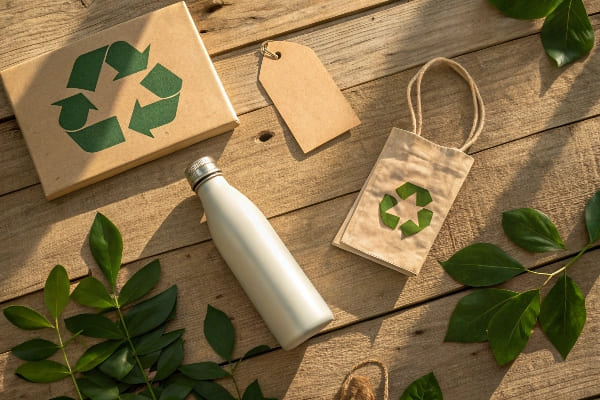
Turning the 7 R's into vendor specs
I write each "R" as a checklist line that a factory can follow. I keep language plain and numbers visible.
– Rethink: combine primary, secondary, and display into one plan. Design cartons that ship flat and fold fast in stores.
– Refuse: remove plastic windows, metallized laminates, and mixed films that ruin sorting.
– Reduce: right-size ECT and flute. Light-weight glass. Strip any blank space from carrier die-lines.
– Reuse5: pick returnable glass where loops exist. Use modular corrugated displays that accept refills for seasonal swaps.
– Repair: add replaceable support tabs or sleeves on displays so stores can fix minor damage without a full swap.
– Recycle
–6: choose FSC fiber, water-based inks, and dispersion coatings that pass standard recycling streams. Print "flatten me" prompts and fiber grade.
-* Recover/Rot: for food-contaminated fiber, plan for energy or compost options where allowed. Do not claim "compostable" unless certified.
| "R" | Spec line we use | Proof point |
|---|---|---|
| Rethink | Flat-pack design; ≤ X min setup | Assembly video + line trial |
| Refuse | 0% plastic lamination | BOM and ink/coating datasheets |
| Reduce | ECT right-sized by drop test | Test report + transit sim |
| Reuse | Display frame keeps 3 cycles | Store feedback + photos |
| Recycle | Water-based inks only | Ink SDS + printer sign-off |
| Recover/Rot | No PVC or PVDC | Compliance statement |
I train teams to walk this list before artwork lock. It saves time. It prevents greenwashing. It also lowers cost in most cases.
How to make beer more sustainable?
I treat beer as a system. Brewery, packaging, freight, store setup, and shopper all matter. I start with quick wins and then scale.
Lightweight primary, fiber-based secondary, water-based print, flat-pack displays, and smarter logistics make the fastest gains; add returnable loops where local, and publish clear recycling cues on pack.

A step-by-step plan I use with buyers
I work with large retail chains and brand owners. Many of them launch new SKUs under tight deadlines. We move in short, clear steps.
1. Audit current pack
List weights, materials, coatings, and case counts. Photograph pallet patterns. Record damage and returns.
2. Cut weight first
Move to wrap-around paperboard carriers or fiber clips. Right-size corrugate. If using glass, move to light-weight.
3. Switch to cleaner print
Water-based inks and dispersion coatings lower VOCs and keep fibers recyclable. Digital short-runs help pilots and seasonal art with less waste.
4. Design for one-material sorting
Avoid plastic windows and foil. Use wash-off paper labels on bottles. Keep adhesives within recycling specs.
5. Optimize cube and logistics
Flat-pack modular POP displays reduce truckloads and protect goods. We design floor and pallet displays that assemble in minutes.
6. Pilot returnable glass where local
Start with taproom or city loops. Use crates that nest. Track wash rates and breakage.
7. Train stores
Provide one-page assembly guides. Add QR codes with setup video. The faster the setup, the fewer damaged packs.
8. Report results
Publish grams saved per pack, truckloads avoided, and recycled content share. Keep claims simple and verifiable.
| Action | Typical Result | Time to Implement |
|---|---|---|
| Switch to fiber can-clips | Remove plastic rings | 2–6 weeks |
| Move to water-based inks7 | Lower VOCs; cleaner recycling | 1–4 weeks |
| Right-size corrugate | 8–15% board savings | 1–2 weeks |
| Flat-pack displays | Fewer pallets; faster setup | 2–3 weeks |
| Lightweight glass | 10–20% glass saved | 6–12 weeks |
| Returnable loop pilot | Reuse cycles; brand story | 8–16 weeks |
I focus on proof. We run load-bearing and transport tests. We share photos from the field. We keep artwork accurate between sample and mass run, so color stays true.
Conclusion
Sustainability wins when choices are simple. Choose fiber, cut weight, design for sorting, and add return loops where local. Test early. Print clear guidance. Report real numbers.
Explore the advantages of aluminum cans, including their lightweight nature and strong scrap value, which can enhance sustainability. ↩
Learn how using paperboard carriers can reduce plastic waste and promote recycling, making your packaging more eco-friendly. ↩
Find out how flat-pack displays can save space and reduce transportation costs, making them an efficient choice for retailers. ↩
Explore the advantages of returnable glass bottles, including sustainability and reduced environmental impact. ↩
Exploring this resource will provide insights into sustainable packaging solutions that enhance efficiency and reduce waste. ↩
This link will help you understand the importance of eco-friendly materials in packaging and their impact on recycling. ↩
Explore the advantages of water-based inks for eco-friendly packaging solutions and their impact on VOC reduction. ↩

